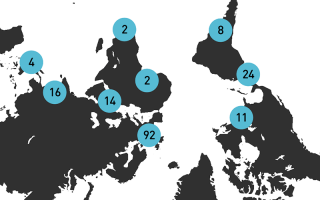My name is Victoria, I studied in the SDP Master during 2016-2017, and now I am working in the Planning Department of the Social Development Area at the Municipality of Renca, in Santiago de Chile, South America.
The most important skill I acquired during this Masters was critical thinking on how development is understood and how the impact of social policies have consequences depending on both the overt and hidden interests of the ones who take the decisions.
This Masters helped me gain a critical understanding of the process of globalisation, now I am aware of the differences of power within the social groups in my country. For instance, I believe that in Chile the ideal of social justice has been hindered by the implementation of neoliberal policies applied by the dictatorship during the 80s, which have consolidated the segregation of low-income groups and an unequal distribution of resources. This has reinforced my opinion about focusing social policies towards the recognition of the needs of vulnerable groups, and the promotion of participatory spaces that involve the interests of the whole civil society.
Before I came to the UK, I worked at an NGO called Techo, “A Roof for Chile”, whose aim is to promote housing rights. I also worked in another Municipality in charge of an urban and social programme oriented towards the recovery of public areas in vulnerable neighbourhoods. After undertaking the Masters, my understanding of housing policies and urbanism changed. Although my previous experiences helped me to acknowledge the characteristics of each context through participatory practices, in order to recognise the voices of the dwellers. Since the Masters, I recognise the relevance of working at scale, in other words, the need to generate urban and social strategies that consider the city as a whole, rather than just being focussed on the needs of particular territories. I believe that this new perspective is highly influenced by my new understanding of poverty, more precisely, relational poverty. Now, I highly believe that poverty is the result of unbalanced relations of power in the societies, rather than being a result of people who are not inside the market as a consumer or a producer. This is why I believe when we want to tackle poverty, we have to analyse the unbalanced relationships that maintain that inequality.
Nowadays I am working for the Municipality of Renca. Renca is a borough in Santiago with 140.000 inhabitants approximately (INE- Censo, 2017). The Municipal budget per capita is around USD 350, rather than USD 1.250 in the wealthiest Municipalities of Santiago (Subdere-Sinim, Sistema Nacional de Informacion Municipal). In 2017, the Multidimensional Poverty index was 26% (Casen, 2017), which is a relatively high number considering the rest of the city. It is from this context, the Major Claudio Castro decided to take a communitarian approach to local government inventions. A government plan was co-created through a participatory process, in which three key areas emerged (Renca, 2019):
- The relevance to recover the identity and heritage of the communities.
- The importance to recover the social tissue through spaces of participation.
- The aim to turn Renca into a model of sustainable growth.
As a consequence, every plan or strategy developed by the Municipality, has to contribute to this 3 main areas, “Renca Proud”, “Renca Participates” and “Renca Grows”.
One of the main projects of the Municipality is to develop the Cerros the Renca Metropolitan Park. Renca has the highest hill of the region, however it was abandoned decades ago. We are convinced that if we transform this space into green parks and areas of culture and heritage development, this park will contribute to the promotion of urban and environmental justice in Santiago. I believe that this project is an example of how to use the scale in the city, as a way to redistribute natural resources in vulnerable areas. The Metropolitan Park will be developed through the coordination between the Government, the Private Sector, NGOs and the community.
Finally, being an SDP student has reinforced in me the idea that I am a political actor whatever the job I have, and that it is our responsibility to be aware of that, as well as to be an active agent in reducing current inequalities. Fairer societies can be achieved if we actively look for them, questioning how things have been done until today. Sometimes, this has meant that in conversations with family and friends I often have to say things that others do not want to hear, for instance, on addressing the gender inequalities happening every day or attitudes that stigmatise others who are different than us. I believe that if we want to reach fairer societies we need to have an active role, otherwise, unfair actions will continue and social change leading to a better society will not be possible.
• Renca, 2019. Renca, a communitarian approach towards sustainable development.
www.renca.cl
 Close
Close


